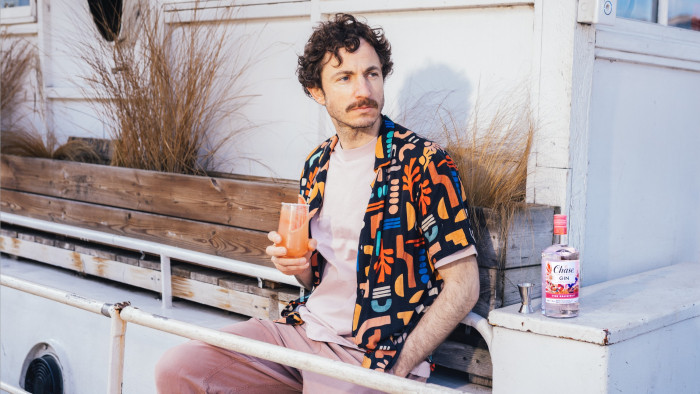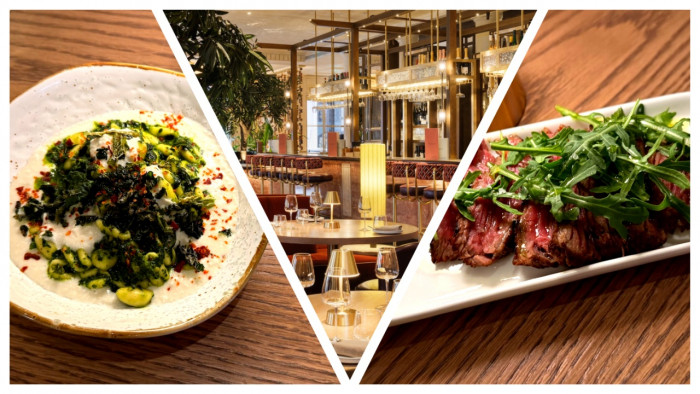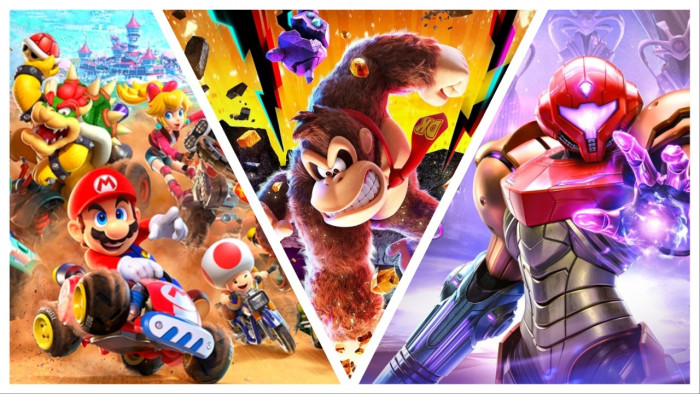Days fall into two camps for the Foo Fighters. It’s simple enough, Dave Grohl tells me in between ordering a bottle of sake and grabbing a mouthful of sushi during dinner: one is show-day drinking, the other is day-off drinking. It’s all about the timing, you see. The former 24 hours involves cracking open beers early evening during soundcheck (and beyond), and the latter is a total free-for-all. What this means in reality, is that one of the world’s biggest rock bands turns up to our photoshoot on the roof of Sao Paulo’s Hyatt Hotel more than a little intoxicated. “We’ve been drinking champagne the entire flight here,” says guitarist Pat Smear as we’re introduced, “so this’ll be fun.”
Once boozers of epic proportions (10 shots per man was formerly the pre-show ritual), if the Foos seem a little mellow now, it’s worth mentioning their method of travel into Brazil’s largest city: private jet. These guys do rock stardom properly, but that doesn’t mean they’ll let their egos get in the way of our photographer’s demands.
“I hate doing photoshoots,” explains Grohl later, carefully lining up three cigarettes next to his beer. “Now, at 46 years old, I’m like, ‘Can I just smile?’ The other day we walked into a venue in Chile, and the show poster looked like the cast of Friends because we were hugging and smiling. We’re always f*cking laughing.”
To be fair, there’s a hell of a lot to smile about. Once a high-school dropout who worked in a furniture warehouse, things soon took a turn for the better: Grohl toured with hardcore band Scream, played drums in Nirvana and finally took centre stage with the Foos, alongside guitarists Smear and Chris Shiflett, bassist Nate Mendel and drummer Taylor Hawkins (after years of revolving members, this line-up has been unchanged for 10 years). That was 21 years ago. Eight albums and 22 million worldwide record sales later, the band are currently on the South American leg of a worldwide tour.
It’ll be three hours of well-trodden Foos tracks, but also a chance to road test their eighth album Sonic Highways, which shares its title with Grohl’s accompanying HBO series. The follow-up to his 2013 Sound City, it’s an eight-part tour of US cities looking into their music scene.
Grohl directed and conducted interviews with a spectrum of peers and elders, including Dolly Parton, Pharrell Williams and (to give you an idea of the man’s friends) Barack Obama. Knowing he wanted the president to be the “exclamation point” in a story about America’s music, he simply “had someone call the White House”. “It was as casual as this is,” he continues. “You never forget you’re chatting to the president, but it feels like you’re talking to a real person.”
BEYOND GRUNGE
Foo Fighters’ story begins in 1994. In April that year, Grohl’s Nirvana bandmate, Kurt Cobain, died from that fateful, self-inflicted shotgun wound. At the time, Grohl refused to speak about events surrounding his friend’s suicide, “but it’s OK now,” he says when I tentatively broach the subject. It was never an option for Grohl and bass guitarist Krist Novoselic to continue without Cobain, but with the sudden end of Nirvana a new band began to form. “What did I have to lose? I didn’t feel I could do anything wrong because I had nothing left,” Grohl told a newspaper in 2011. The drummer had been writing songs and released an album in 1995, every instrument played by himself: seven albums have followed suit. But standing up front was a role he had to grow into.
“When I first started, I didn’t know how to be a frontman or a lead singer,” he says. “I was f*cking terrified. After Nirvana, I knew I could play drums for the rest of my life, but I was so young when the band ended. I didn’t want to just become a drummer for hire.”
One thing Grohl has never done while playing with the Foo Fighters is perform Nirvana songs. Would he ever change his mind? “No way,” he says, his voice notably quieter. “That music and those songs hold such a special place in my life because it was life. The fundamental difference between Nirvana and Foo Fighters is this band has always been a celebration of the future. Foo Fighters was meant to keep the ball rolling so we could all stay alive.”
When a celebrity’s new haircut is fodder for half a dozen new stories, Nirvana’s pre-internet cultural domination feels remarkably alien. In our world of instant interaction, would the band have had the same impact? Would Nirvana even happen now? Grohl has no doubt in his mind. “If they were Kurt’s songs, yes. That’s the reason Nirvana got popular: Kurt’s lyrics, his voice and his songs.I think it would have had the same impact because he was a f*cking amazing songwriter.”
Grohl himself isn’t half bad, either. After critics dismissed early records as “Nirvana, but not as good”, he can now gleefully point to his 13 Grammy Awards (plus an International Band nomination at this year’s Brits). A talented frontman in his own right emerged, and took his rightful place at the fore of Foo Fighters.
SHAKING IT UP
The day the band arrives, security steps up a notch. Intimidatingly hench bodyguards appear: in reception, by the pool, in the lift. Legions of fans begin queuing outside the hotel, hoping for a glimpse. The excitement is palpable, touchable. One man asks me if a musician is staying at the hotel, and his reaction when I tell him says a lot about this band’s fans: “You’ve got to be joking? I f*cking love those guys.”
Hawkins, a blond, lanky livewire who shares Grohl’s enthusiasm for pretty much everything, agrees. “They’re nuts,” he grins. “We’re in Buenos Aires, and there are f*cking 300 kids outside the hotel. We’re not that kind of band. We’re not One Direction. I don’t understand how they know the words.”
This giddy, can’t-quite-believe-it attitude permeates throughout the band. Despite being 20 years into his Foos career, it still genuinely surprises Grohl that they sell out stadiums. “I’m blown away. We haven’t strayed from where we began. If you put five of us in the room, it [could] still be 1996.”
Herein lies an interesting point about Foo Fighters’ mammoth popularity. They’ve been pumping out rock hits (The Walk, Everlong, Times Like These, Best Of Me) since 1995. It’s evidently a winning formula. But when you’ve been in generation-defining bands that don’t, or won’t, deviate too far from riffy pop rock, doesn’t it start to lack a certain excitement after so long?
“That’s why we did Sonic Highways,” explains Grohl. “I thought it’d be more interesting to do it in a way we’d never done. Once you feel like you’re stuck in the same place, that’s when it becomes monotonous.”
Has he ever felt that way? “No. But you have to make an effort to ensure that happens. It’s one of the great things about the digital age. Like the U2 thing, people considered that a failure, but they tried something no one had done before, and whether it worked or didn’t work doesn’t necessarily matter. Who the f*ck else could do it? What are U2 going to do? Walk into the studio and make another record? I’m sure they feel the same way. They’re looking for ways to change up the process, to keep it alive, just as we are.”
After all they’ve accomplished, complacency certainly isn’t a word you’d use to describe this band. “How could it not be exciting still?” says Hawkins. “You’d have to be pretty f*cking jaded. We’re living our childhood fantasy. When I was a kid I’d look at Alice Cooper and Queen records, or interviews in Creem magazine and think, ‘How do you do that?’ Now we are.”
Whether it’s sell-out stadiums or intimate gigs, if you’re going to see the Foo Fighters anywhere in the world, South America is apparently the place to do it.
“Have you seen shows here?” asks Grohl. “You’re going to f*cking freak out. You’re going to lose your mind. Just wait.”
HELLO SAO PAULO
I’m sitting in the back of a blacked-out car being chased by five policemen. To my left, right and up ahead yet more motorbikes with bulletproof-vested forces appear. Sirens scream from every angle. Thankfully, they’re not after me, but escorting Foo Fighters to the stadium; parting the cars on the road like some sort of Brazilian Moses.
Arriving early, I walk off to meet fans who have been queuing outside Morumbi football stadium since 10am. One such fan is Pesto Castro, a 25-year-old who travelled overnight from Londrina (eight hours’ drive) to ensure his prime position up against the railings: “Last time I saw Foo Fighters, I didn’t go to the bathroom for 11 hours. I didn’t want to miss a thing.” For those who still believe Foo Fighters fans are simply Nirvana-lovers keen for anything Kurt-related, the reality couldn’t be further from the truth. Every person I speak to is either decidedly nonplussed at the mention of Grohl’s previous band or simply not interested. “I love their energy,” Castro tells me. “It’s more than music, they’re a unit.”
Finally, the lights dim and the ear-deafening screams of an entire stadium hit. As the band launches into Something From Nothing’s guitar riff, I suddenly understand what each Foo Fighter had warned me of: the floor is shaking under the weight of fans jumping headfirst into the crowd; the equipment behind me is rocking back and forth. South American fans certainly haven’t let the side down.
Shooting through hit after hit, Grohl is at his charismatic best: “You guys are f*cking loud and I like it a lot.” Once Best Of You rolls around, the band has disappeared and it’s just the crowd, the frontman and his guitar. Night has fallen and the sight of thousands of smartphone torches is breathtaking. Grohl invites a young man on to the stage who turns to his girlfriend and asks: “Monica, will you marry me?” (“We didn’t plan this, I swear,” their manager John Silva tells me.)
The band appear behind Grohl and suddenly they’re together again. Standing grouped on stage they look smaller, but you realise how they’ve survived the throes of a ludicrously fickle music industry and come out the other end smiling. As they pass a bottle of champagne back and forth, they could be performing to 13,000 pairs of eyes or simply be five guys jamming in their garage.
FIGHTING BEYOND
Back at the hotel, with bedtime seemingly still a long way off, I ask Grohl whether he ever imagined becoming one of the world’s most successful musicians. “When I was young, my biggest goal was to be the best drummer in our local punk rock scene. I never imagined I’d go to New York or Los Angeles, because I was a teenager mowing f*cking lawns to get money to buy weed before the show. I didn’t have any kind of career foresight.
It was just like, ‘When we play on Friday night, I’m going to tear people’s f*cking heads off.’”
With the Foo Fighters soon hitting their third decade, Grohl nearing 50 and album nine already planned, it’s safe to assume they’ll be tearing people’s f*cking heads off for years to come.
Sonic Highways out now on Columbia Records, new single Congregation is out on 2 March. The band play Wembley Stadium on 19 & 20 June
(Image: Danny North)
Latest
Related Reviews and Shortlists










